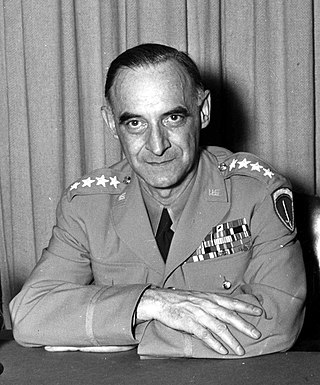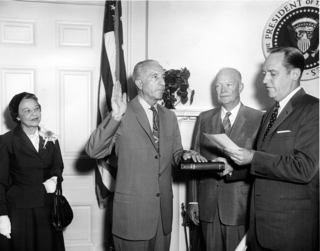
Dwight David Eisenhower, nicknamed Ike, was an American military officer and statesman who served as the 34th president of the United States from 1953 to 1961. During World War II, he served as Supreme Commander of the Allied Expeditionary Force in Europe and achieved the five-star rank as General of the Army. Eisenhower planned and supervised two of the most consequential military campaigns of World War II: Operation Torch in the North Africa campaign in 1942–1943 and the D-Day invasion of Normandy in 1944.

Robert Alphonso Taft Sr. was an American politician, lawyer, and scion of the Republican Party's Taft family. Taft represented Ohio in the United States Senate, briefly served as Senate Majority Leader, and was a leader of the conservative coalition of Republicans and conservative Democrats who blocked expansion of the New Deal. Often referred to as "Mr. Republican", he co-sponsored the Taft–Hartley Act of 1947, which banned closed shops, created the concept of right-to-work states, and regulated other labor practices.

Gordon Gray was an American attorney and government official during the administrations of Harry Truman (1945–53) and Dwight Eisenhower (1953–61) associated with defense and national security.

General Lucius Dubignon Clay was a senior officer of the United States Army who was known for his administration of occupied Germany after World War II. He served as the deputy to General of the Army Dwight D. Eisenhower in 1945; deputy military governor, Germany, in 1946; Commander in Chief, United States Forces in Europe and military governor of the United States Zone, Germany, from 1947 to 1949. Clay orchestrated the Berlin Airlift (1948–1949) when the USSR blockaded West Berlin.

Wilton Burton "Jerry" Persons was an American military officer who served as the White House Chief of Staff to President Dwight D. Eisenhower from October 7, 1958, until January 20, 1961.

Andrew Jackson Goodpaster was an American Army General. He served as NATO's Supreme Allied Commander, Europe (SACEUR), from July 1, 1969, and Commander in Chief of the United States European Command (CINCEUR) from May 5, 1969, until his retirement December 17, 1974. As such, he was the commander of all NATO (SACEUR) and United States (CINCEUR) military forces stationed in Europe and the surrounding regions.

Isaac Davis White was a senior officer in the United States Army who commanded the U.S. Army, Pacific (USARPAC) from July 1957 to March 1961. He was commissioned in the cavalry in 1923 and went on to serve in World War II and the Korean War. Because of his extensive experience in tank warfare, at his retirement Armor magazine dubbed him "Mr. Armor".

Albert Merriman Smith was an American wire service reporter, notably serving as White House correspondent for United Press International and its predecessor, United Press. He won the Pulitzer Prize in 1964 for his coverage of the assassination of John F. Kennedy and was awarded the Presidential Medal of Freedom in 1969 by Lyndon B. Johnson.

Robert Bernard Considine, was an American journalist, author, and commentator. He is best known as the co-author of Thirty Seconds Over Tokyo and The Babe Ruth Story.

Hanson Weightman Baldwin was an American journalist who was the long-time military editor of The New York Times. He won a Pulitzer Prize "for his coverage of the early days of World War II". He wrote or edited numerous books on military topics.
Robert John Donovan was a Washington correspondent, author and presidential historian. He died from complications from stroke.
Kevin C. McCann was a biographer of Dwight D. Eisenhower and he served as president of Defiance College in Defiance, Ohio.
Don Whitehead was an American journalist. He was awarded the Medal of Freedom. He won the 1950 George Polk Award for wire service reporting.

Everett Strait Hughes was a major general in the United States Army and served as the 17th Chief of Ordnance for the U.S. Army Ordnance Corps. He is known for his close association with Dwight D. Eisenhower. Hughes was born in Ipswich, Dakota Territory, was a West Point graduate, and rose to become major general in the U.S. Army. He fought in a number of battles including the Mexican border war and World War I. During World War II he was one of George S. Patton's close friends and Eisenhower's "right-hand man" during the entire European campaign.

Edward Thomas Folliard was an American journalist. He spent most of his career at The Washington Post, for which he covered the White House from the presidency of Calvin Coolidge to that of Lyndon B. Johnson. He had friendly relations with both Harry S. Truman and Dwight D. Eisenhower that continued beyond those men's presidencies.
This bibliography of Dwight D. Eisenhower is a list of published works about Dwight D. Eisenhower, the 34th president of the United States.
Frank L. Kluckhohn was an author and journalist.
Price Day (1907-1978) was a war correspondent for the Baltimore Sun who won a 1949 Pulitzer Prize for International Reporting.

Dixie Tighe (1905–1946) was an American war correspondent.
Paul William Ward (1905-1976) was a Baltimore Sun correspondent who won a Pulitzer Prize for his overseas reporting "Life in the Soviet Union" in 1948.












